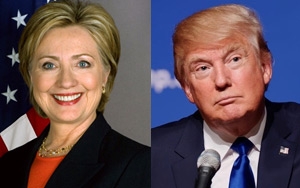Commentary
Google, Bing Rev Up Political Data Engines
- by Laurie Sullivan , Staff Writer @lauriesullivan, March 16, 2016
 Marco Rubio quit the presidential race Tuesday after losing his home state to Donald Trump in the Florida primary. Former Secretary of State Hillary Clinton has swept Florida, Ohio, and North
Carolina. Ohio Governor John Kasich won in his home state.
Marco Rubio quit the presidential race Tuesday after losing his home state to Donald Trump in the Florida primary. Former Secretary of State Hillary Clinton has swept Florida, Ohio, and North
Carolina. Ohio Governor John Kasich won in his home state.
Woven into the political news-making headlines, Google introduced new features to Google Search that track the primaries to educate those who are interested more about the candidates.
Google added campaign finance information to show the percentage of funds coming from SuperPACs versus individuals, and how they are trending compared with one another -- as well as the industries that are more heavily backing a candidate.
Another feature analyzes search trends related to the candidates and makes data from those available directly through Google Search. Search results for a candidate show how others have searched for them and their opponents over time. The features are available on desktop as well as the mobile Web and mobile apps.
The trending feature, which is not new, shows how events such as debates and speeches can trigger spikes in search queries on Google for specific candidates. It shows search activity, but provides no indication of intent or sentiment related to how U.S. voters will cast their ballot or how they feel about a specific candidate.
Bing also supports a trending feature. In February, Bing added a feature powered by Bing Predicts called Search Wave to its engine that provides a closer look at presidential candidates. The tool provides a closer look at each candidate, allowing people to see what others search for about that candidate on Bing.
The data breaks down the demographics by age. For example, Bing estimates that 41.1% those ages 18 to 34 are searching for information about Trump, followed by Sanders at 22.9%, Clinton at 15.3%, and other at 21.7%.
Overall on Tuesday evening, Trump led the number of search queries in the U.S., according to Google Trends, which monitors the number of searches on google.com. Ted Cruz started out trending in the No. 2 position, but by 7 P.M. PT Rubio stepped up from No. 4 into the No. 2 position. Cruz slipped to No. 3 and Kasich to No. 4.
In Ohio, trending data looked a little different for the Republican Presidential candidates. Trump came in at No. 1, followed by Kashich, Cruz, and Rubio.
Overall, across the U.S. on Tuesday evening, searches on Democratic candidates held steady with the majority of searches on google.com going to Bernie Sanders vs. Clinton.



